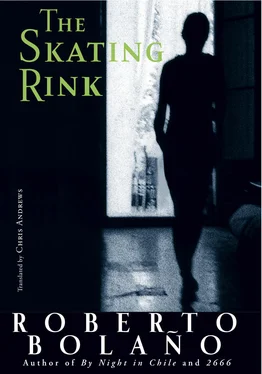Gaspar Heredia:
The opera singer was never an official resident of the campground
The opera singer was never an official resident of the campground; her name did not appear on the register at reception, and she never paid a peseta to sleep there, or anywhere else for that matter. The cleaning ladies didn’t know about her, nor did the receptionists; just El Carajillo and me. Her name was Carmen, and from the beginning of spring to the middle of fall, she spent her days in Z, sleeping wherever she could, wherever she was left in peace, under the ice cream stands on the beach, or in the apartment buildings’ enclosures for trash cans. El Carajillo knew her well and seemed to like her, though he didn’t give much away when I tried to find out more; they must have been about the same age, and sometimes that’s enough to create a bond. She supported herself by singing in the cafés and streets of the historic center. Her varied repertoire was all she remembered of her glory days, so she said. Naples was the name of her absolute triumph, the culmination of a splendid and terrible period, which she never recounted in detail, beyond saying that she sang both Mozart and José Alfredo Jiménez. Her efforts were rewarded with hundred-peseta coins. The relationship between Carmen and the girl seemed to be based on a strange pact of loyalty rather than friendship. Sometimes they seemed to be mother and daughter, or grandmother and granddaughter, sometimes they were more like statues accidentally set down side by side. The girl, who went by the name of Caridad, smuggled the old lady in every night under El Carajillo’s indulgent gaze. They shared a tent next to the pétanque ground, and were both in the habit of going to bed late and sleeping in. It wasn’t hard to pick out their tent from a distance: all around it, like the turrets of a miserable fortress, were little foot-high pyramids of rubbish, or rather of sundry used and useless objects which they hadn’t quite thrown away. To be honest, it’s a miracle that we weren’t continually flooded with complaints. Maybe Caridad’s neighbors didn’t think it was worth it, since they were just passing through, or maybe they had given up. In reception there was a list of clients who were behind in their payments; Caridad was at the top of it (with two months’ due) and according to the Peruvian she would soon be asked to leave. Wouldn’t it be better to offer her a job? That’s what the receptionists thought, but it was Bobadilla’s decision, and apparently he was scared of her. According to the Peruvian, you could often tell she was carrying a knife. I didn’t want to believe him but was haunted, in spite of my skepticism, by an evocative image: Caridad wandering through the town (which I hardly knew, since I rarely left the campground), with a kitchen knife under her tee-shirt, lost in blurry-eyed contemplation of something that nobody else could make out. The knife had a history, as I later discovered. Caridad had come to Stella Maris with a boyfriend, before the beginning of the season. They spent the first days looking for work. It was a month of record rains, according to El Carajillo (I was in Barcelona at the time and I vaguely remember the sound of the rain beating against the window of my room), and that was when Caridad started coughing and looking ill. She and her boyfriend had no money and basically lived on yogurt and fruit. Sometimes they got drunk on beer and spent the whole day cooped up in their tent, whining and whispering sweet nothings. Then they found work washing dishes in the kitchen of a bar on the Paseo Marítimo, but two weeks later Caridad came back to the campground in the middle of the day, and never went back to work. Soon after that the fights began. One night they chased each other down to the reeds. El Carajillo heard something and left the office and walked around the swimming pool to see what was going on. He found Caridad lying in a heap, covered in scratches and hardly breathing. She wasn’t dead, as he thought at first; her eyes were open and she was looking at the grass and the sandy ground. It took her a while to realize that someone was trying to help her. Sometimes cries came from their tent, and it was hard to tell for sure if they were cries of pain or joy. The boy was pale and always wore long-sleeved shirts. He had a motorbike, on which they had arrived at the campground, but after that they hardly used it. Caridad liked walking, walking aimlessly, or remaining absolutely still; and maybe he preferred not to spend money on gas. Both of them were under twenty and they both had a look of utter hopelessness about them. One night Caridad turned up on the terrace with a knife, alone; the next morning her friend left Stella Maris and didn’t come back. Or that was the most popular version of the story — the one Bobadilla heard when he came in the afternoon to cast an eye over the accounts and give them his blessing. Caridad didn’t spend much time at the campground. One night El Carajillo saw her come in with Carmen but didn’t say anything. The following night he said he would turn a blind eye, on one condition: that the old woman didn’t sing. The relationship between the two women was compounded of chance and necessity: Carmen paid for the coffees, Caridad provided a place to sleep; during the day they kept each other company and wandered all over Z. The old woman sang her heart out, while Caridad observed the people, the umbrellas, the tables covered with drinks. Both of them hated the beach and the sun. One time the old lady, who was the only one who spoke, confessed to me that they swam at night, in the rock pools, completely naked. Moonlight is good for the skin, cutie! In the early hours of the morning, as I listened to El Carajillo snoring, I imagined Caridad kneeling naked on the sand, waiting for a cough that seemed to be rising out of the sea. I never managed to make her smile, although I tried everything I could think of. Before starting work I would buy beer, sandwiches and potato chips at the local supermarket so I could invite them to join me for a meal on the terrace at night. Once I waited for them with a tub of ice cream and three plastic spoons. The ice cream had pretty much melted but we ate it anyway. The old lady thanked me for those attentions by pinching me on the arm and calling me nicknames. Caridad seemed to be watching a film projected in the sky. As the days went by, summer brought a full contingent of tourists to Z, and I had less and less time to spend with them. As the campers arrived, the women seemed to withdraw, fading from the world. One night I found out that Bobadilla and the Peruvian had kicked them out. El Carajillo got away with a reprimand, and that was the end of it. Their tent was in the storeroom, held as security until they paid off their debt. That night I slipped into the storeroom unobserved and searched with my flashlight until I found it, bundled in a corner. I sat down beside it and put my fingers into the folds of the cloth. There was a smell of petrol. I thought I would never see them again. .
Enric Rosquelles:
I found a plumber, an electrician, a carpenter
I found a plumber, an electrician, and a carpenter, and put them to work under the supervision of the only builder in Z I could trust, a ruthless mean individual: the Palacio Benvingut project was up and running. I bled money from stones; no one bothered to check on where the consignments or parts of consignments were going. Suspicion is a way of life in this town but nobody dared to suspect me. I didn’t lie, or not systematically. I managed to convince Pilar and three councilors that my project would be good for the town. The builder didn’t know the real purpose of the work (he was right-wing, very right-wing, and I was always afraid he would try to blackmail me). Why did I use him and not someone else? Anyone else would have talked, of course. I found the design I was looking for in a library in Barcelona. I copied it patiently by hand, until I understood how it all worked. Soon the workmen arrived and electricity returned to the Palacio Benvingut. Then I publicly announced the objectives and the extent of the restoration that had been undertaken, but in a vague and low-key way, after all the project was still in its early stages. I estimated that the work would take five years to complete, and foresaw that when completed the facility would be of benefit to the following departments: Social Services, Education, Fairs and Festivals, Culture, Health (!), Community Affairs, Child Welfare, and Security (!). I’m sorry, I can’t help laughing. How could they have swallowed everything I told them? It’s a testament to human gullibility. The only person who said anything was some sad pencil-pusher from Fairs and Festivals who asked me (without any malicious intent, as I have since realized) if I was planning to build a nuclear shelter in the palace’s rock foundations. I looked daggers at him and the poor man regretted having opened his mouth. They were all so naïve and stupid! I achieved my goal in less than a year. For the sake of appearances and because in the long term I really was planning to open the palace to the public (even if no one believes me now), I kept on a couple of unemployed men who worked from eight in the morning till two in the afternoon, cleaning up the other wings of the building. They did almost nothing, of course, and I knew it, but I let them be. From time to time, I sent out a van loaded with paint or planks, or had the old ping-pong table from the drop-in center moved to one of the salons in the palace, just to keep things moving a bit. Pilar is clever, but even she didn’t suspect anything. The communists and the Convergencia i Unión councilors thought it would win us votes in the next elections. Now everyone’s saying the opposite, but at the time they were swayed by my confidence; my willpower was irresistible. There seemed to be no end to the pleasure coursing through every cell of my body. Pleasure blended with fear, I admit, as if I had just been born. I had never felt better in my life, that’s the truth. If ghosts exist, Benvingut’s ghost was by my side. .
Читать дальше












